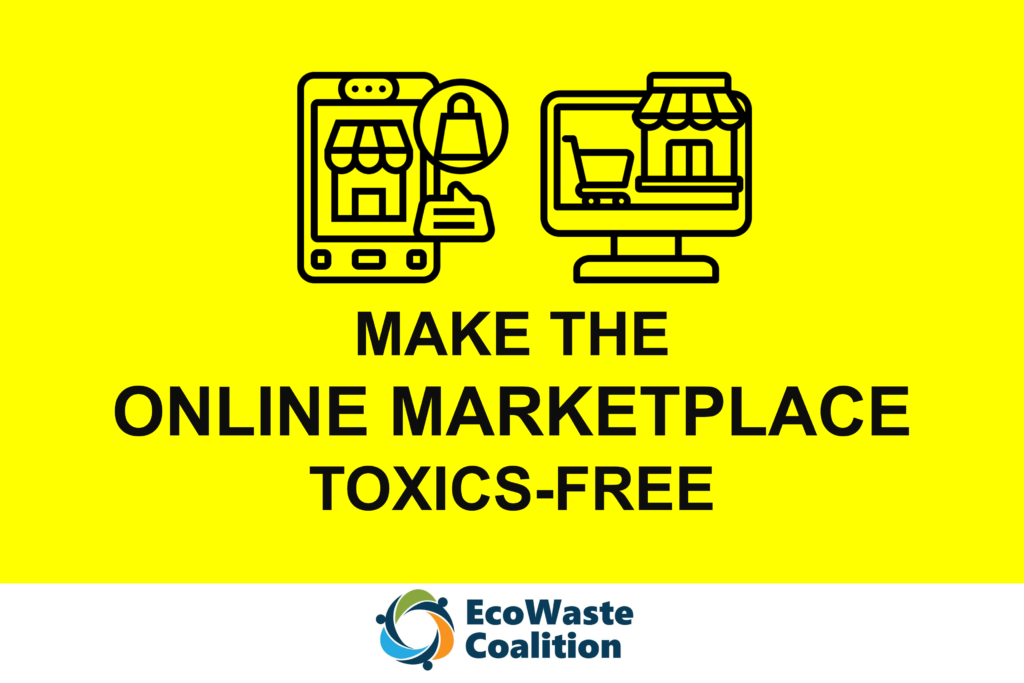As the 12.12 online shopping sales go full blast, the toxics watchdog group EcoWaste Coalition reminded consumers to think “safety first” and avoid purchasing items that can pose risks to human health.
Anticipating the surge of shoppers who will visit popular online marketplaces, the group released a set of practical tips promoting access to product quality and safety information that will help shoppers to navigate e-commerce sites.
The group drew up the said tips to support the government-issued “Guidelines in E-Commerce Transactions for Online Businesses and Online Consumers” and to reinforce the advisory published by the Department of Trade and Industry enumerating what the DTI calls as the “12 SCAMonsters of Christmas.”
By being mindful of these safety reminders and tips, online shoppers can protect themselves from false advertisements, bogus claims, fraudulent transactions, and, most especially, from spending for items that are adulterated, counterfeit and hazardous.
As online shopping platforms are rife with product listings for unauthorized items, including those contaminated with banned or restricted chemical substances, online shoppers are strongly advised to be extra careful when picking and adding items to the cart.
Banned cosmetics containing mercury and other hazardous substances, unregistered health products laden with scheduled poisons, and uncertified consumer electronics are just some of the dangerous goods being offered for sale online.
While this is not an exhaustive list, online consumers are encouraged to heed these tips for a safer shopping experience this Christmas season:
1. Gather information before making a purchase (ask a friend, read customer feedback, ignore fake reviews, and check the Internet for public health warnings, product recall orders, and related advisories).
2. Be assertive in asking for essential information from the manufacturer, distributor or seller that can help you make an informed choice.
3. Read the product listing with caution as it could contain exaggerated and unsubstantiated claims.
4. Scrutinize the product label and watch out for signs of adulteration or imitation, including poor quality image, logo disparity and other labeling inconsistencies.
5. Take note of common red flags for products that are not authentic or lacking market authorization: incomplete product information, labeling in foreign characters without translation, low quality images, grammatical and spelling mistakes, wild claims, unresponsive sellers, etc.
6. Beware of products and services taking advantage of celebrity endorsements without proper authorization.
7. Think thrice before purchasing products sold for extremely low prices that are too good to be true such as high-end MAC lipsticks sold for less than P50, which may contain lead and other contaminants.
8. Refrain from buying uncertified items such as electrical and electronic products, including common household appliances, which are covered by DTI’s mandatory product certification schemes. Non-compliant products may cause electric shock, start a fire or even cause toxic exposures.
9. Know the refund and return policies of online shopping platforms and/or the dealers in case there are problems with what you have purchased.
10. Avoid buying toys and other childcare articles, personal care and cosmetic products, medicines and medical devices, and other regulated products that are not notified or registered with the FDA. These products may pose serious health risks to consumers.
11. Be cautious about toys that pose health and safety hazards such as those with small parts, button batteries, small magnets, long cords, and sharp edges, as well as those laden with lead and other hazardous chemicals, including toxic plasticizers called phthalates.
12. Select duly authorized and labeled toys and other children’s products that are truthfully marked as Bisphenol A or BPA-free, cadmium-free, lead-free, mercury-free and phthalate-free.
13. Shun products that are using the logo of the Philippine or US Food and Drug Administration (FDA) without authorization in the product packaging, marketing, and promotion. (PR


